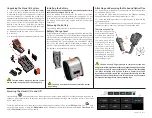
1-4
Issue 01, 04/2005
Krautkramer USM 35X
Introduction
Important information on ultrasonic testing
Operator training
The operation of an ultrasonic test device requires a
proper training in ultrasonic test methods.
A proper training comprises for example adequate
knowledge of:
• the theory of sound propagation
• the effects of sound velocity in the test material
• the behavior of the sound wave at interfaces be-
tween different materials
• the propagation of the sound beam
• the influence of sound attenuation in the test object
and the influence of surface quality of the test ob-
ject.
Lack of such knowledge could lead to false test results
with unforeseeable consequences. You can contact for
example NDT societies or organizations in your country
(DGZfP in Germany; ASNT in the USA), or also GE
Inspection Technologies, for information concerning
existing possibilities for the training of ultrasonic in-
spectors as well as on the qualifications and certifi-
cates that can finally be obtained.
Technical test requirements
Every ultrasonic test is subject to specific technical
test requirements. The most important ones are:
• the definition of the scope of inspection
• the choice of the appropriate test method
• the consideration of material properties
• the determination of limits for recording and
evaluation.
It is the task of those with overall responsibility for test-
ing to ensure that the inspector is fully informed about
these requirements. The best basis for such information
is experience with identical test objects. It is also es-
sential that the relevant test specifications be clearly
and completely understood by the inspector.
GE Inspection Technologies regularly holds specialized
training courses in the field of ultrasonic testing. The
scheduled dates for these courses will be given to you
on request.
1-4
Issue 01, 04/2005
Krautkramer USM 35X
Introduction
Important information on ultrasonic testing
Operator training
The operation of an ultrasonic test device requires a
proper training in ultrasonic test methods.
A proper training comprises for example adequate
knowledge of:
• the theory of sound propagation
• the effects of sound velocity in the test material
• the behavior of the sound wave at interfaces be-
tween different materials
• the propagation of the sound beam
• the influence of sound attenuation in the test object
and the influence of surface quality of the test ob-
ject.
Lack of such knowledge could lead to false test results
with unforeseeable consequences. You can contact for
example NDT societies or organizations in your country
(DGZfP in Germany; ASNT in the USA), or also GE
Inspection Technologies, for information concerning
existing possibilities for the training of ultrasonic in-
spectors as well as on the qualifications and certifi-
cates that can finally be obtained.
Technical test requirements
Every ultrasonic test is subject to specific technical
test requirements. The most important ones are:
• the definition of the scope of inspection
• the choice of the appropriate test method
• the consideration of material properties
• the determination of limits for recording and
evaluation.
It is the task of those with overall responsibility for test-
ing to ensure that the inspector is fully informed about
these requirements. The best basis for such information
is experience with identical test objects. It is also es-
sential that the relevant test specifications be clearly
and completely understood by the inspector.
GE Inspection Technologies regularly holds specialized
training courses in the field of ultrasonic testing. The
scheduled dates for these courses will be given to you
on request.
Summary of Contents for Krautkramer USM 35X
Page 8: ...0 8 Issue 01 04 2005 Krautkramer USM 35X ...
Page 9: ...Krautkramer USM 35X Issue 01 04 2005 1 1 Introduction 1 Introduction 1 ...
Page 20: ...1 12 Issue 01 04 2005 Krautkramer USM 35X ...
Page 27: ...Krautkramer USM 35X Issue 01 04 2005 3 1 Initial start up 3 Initial start up 3 ...
Page 35: ...Krautkramer USM 35X Issue 01 04 2005 4 1 Principles of operation 4 Principles of operation 4 ...
Page 49: ...Krautkramer USM 35X Issue 01 04 2005 5 1 Operation 5 Operation 5 ...
Page 130: ...5 82 Issue 01 04 2005 Krautkramer USM 35X ...
Page 131: ...Krautkramer USM 35X Issue 01 04 2005 6 1 Documentation 6 Documentation 6 ...
Page 135: ...Krautkramer USM 35X Issue 01 04 2005 7 1 Maintenance and care 7 Maintenance and care 7 ...
Page 148: ...7 14 Issue 01 04 2005 Krautkramer USM 35X ...
Page 177: ...Krautkramer USM 35X Issue 01 04 2005 9 1 Appendix 9 Appendix 9 ...
Page 190: ...9 14 Issue 01 04 2005 Krautkramer USM 35X ...
Page 191: ...Krautkramer USM 35X Issue 01 04 2005 10 1 Changes 10 Changes 10 ...
Page 193: ...Krautkramer USM 35X Issue 01 04 2005 11 1 Index 11 Index 11 ...













































